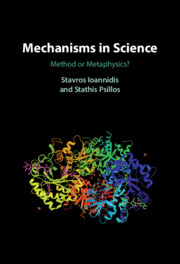Book contents
- Mechanisms in Science
- Mechanisms in Science
- Copyright page
- Dedication
- Contents
- Figures
- Preface
- Introduction
- Part I Ideas of Mechanism
- Part II Causation and Mechanism
- Chapter 3 Mechanisms in Scientific Practice
- Chapter 4 Mechanisms as Causal Pathways
- Chapter 5 Mechanisms, Causation and Laws
- Chapter 6 Against Activities
- Chapter 7 Whither Counterfactuals?
- Part III Beyond New Mechanism
- Finale
- References
- Index
Chapter 4 - Mechanisms as Causal Pathways
from Part II - Causation and Mechanism
Published online by Cambridge University Press: 09 June 2022
- Mechanisms in Science
- Mechanisms in Science
- Copyright page
- Dedication
- Contents
- Figures
- Preface
- Introduction
- Part I Ideas of Mechanism
- Part II Causation and Mechanism
- Chapter 3 Mechanisms in Scientific Practice
- Chapter 4 Mechanisms as Causal Pathways
- Chapter 5 Mechanisms, Causation and Laws
- Chapter 6 Against Activities
- Chapter 7 Whither Counterfactuals?
- Part III Beyond New Mechanism
- Finale
- References
- Index
Summary
In Chapter 4 we build on the discussion in Chapter 3 in order to argue that understanding mechanisms in the Causal Mechanism sense is all that is needed in order to understand biological practice. We clarify the main commitments of our view by presenting three theses that together constitute Causal Mechanism: (1) Mechanisms are to be identified with causal pathways; (2) causal relations among the components of a pathway are to be viewed in terms of difference-making; and (3) Causal Mechanism is metaphysically agnostic. A key point is that, in contrast to mechanistic theories of causation, for Causal Mechanism causation as difference-making is conceptually prior to the notion of a mechanism. We examine in some detail the discovery of the mechanism of scurvy in order to argue that difference-making is what matters in practice. We then turn to the main inflationary accounts of mechanism and contrast them with our deflationary view and its metaphysical agnosticism. We argue that Causal Mechanism offers a general characterisation of mechanism as a concept-in-use in the life sciences that is deflationary and thin, but still methodologically important.
Keywords
- Type
- Chapter
- Information
- Mechanisms in ScienceMethod or Metaphysics?, pp. 90 - 117Publisher: Cambridge University PressPrint publication year: 2022



